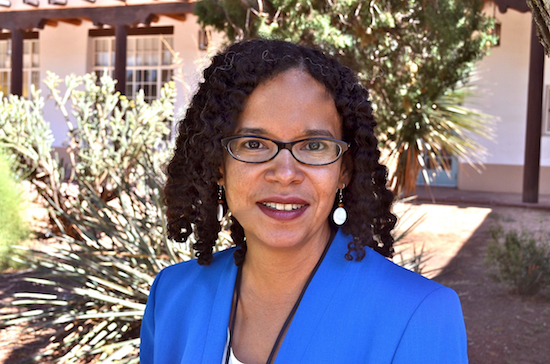STEM shoutout: Dr. Nancy López
UNM sociologist introduces idea of “street race”
Professor of Sociology Dr. Nancy López was recently promoted to full professor in the sociology department.
López this year was awarded two prestigious recognitions including the 2018 William Foote Whyte Award for Sociological Practice and Public Sociology from the American Sociological Association (ASA) as well as being elected for a four-year term as the ASA secretary-elect beginning August 2018.
López has made great strides in changing the conversation in sociology as of late with her current focus of research, the “street race” concept. López, who also co-founded and continues to direct the Institute for the Study of “Race” and Social Justice at UNM, was the lead author of the publication entitled, “What’s Your “Street Race”? Leveraging Multidimensional Measures of Race and Intersectionality for Examining Physical and Mental Health Status among Latinxs.”
The publication, was published in Sociology of Race and Ethnicity, outlines the concept López coined as “street race” which describes this idea: if you were just walking down the street, what race do you think other Americans would automatically assume you are based on your looks?
“The “street race” concept has traveled beyond academia (Smithsonian Showcase, Scholars Strategy Network, The Conversation, Ted Talk) and it underscores that race is a social constructed master status that is not biologically or genetically based,” López said.
López has focused her research on educational and health inequality in vulnerable communities, particularly Latinas/os/xs intersectionality, to further examine the relationship between race, gender, class and other systems of power. Throughout her work López says she aims to create bridges of understanding and synergies among scholars, practitioners, teachers, community, and policy-makers.
“It is my hope that as the “street race” travels it can potentially to dislodge essentialist, colorblind understandings of race that have become hegemonic in policy making and practice. it is also my hope that this intersectional data can provide a complex picture of the configurations of inequality unique to the NM landscape and how higher education can advance equity-based policy,” López said.
López and her colleagues and student recently co-authored an article on this theme in a special issue of Race, Ethnicity and Education on critical race theory and quantitative research methods and she is working to share this information with stakeholders in NM legislature, institutions of higher education, and diverse communities.
Throughout her career, López has served on 60 committees at UNM and has embraced many opportunities to engage in policy-relevant leadership opportunities.
“I use my sociological knowledge projects to spearhead transformational policies in: curriculum, faculty hiring, and community engagement. I have convened and participated in symposia on the future of the Hispanic origin and race question for 2020 Census,” López said.
Though there are many, one of her most distinguished contributions to UNM includes her leadership in the Institute for the Study of “Race” and Social Justice, which established the first “Race & Social Justice” 15-credit interdisciplinary graduate certificate in the country in 2016. The certificate is now open to anyone community member with a BA/BS degree or higher. The Institute has been working on seeking approval for the undergraduate version of the certificate in the near future.
“The Institute’s mission is to convene interdisciplinary scholars, students, and community meet monthly to cultivate trans-disciplinary engaged research and policy at the University of New Mexico,” López said.

